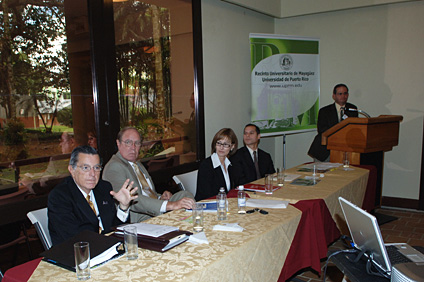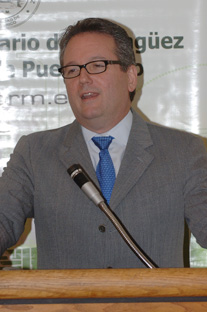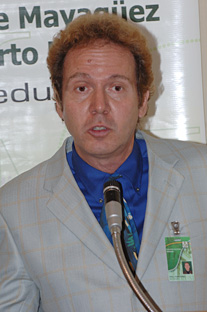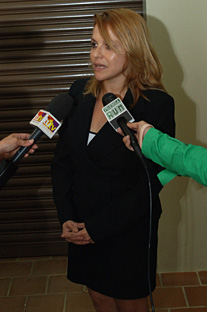|
|
|
Friday, February 20th 2009 [ versión español ]
The University should assume the role as leader of the advancement of the service division in Puerto Rico. With this mission in mind, the Department of Industrial Engineering (ININ by its Spanish acronym) of the University of Puerto Rico at Mayagüez (UPRM), held a round table discussion this past February 10, 2009 entitled, The modernization of the service division: improving the quality of life and the competitiveness of Puerto Rico at the world level.
The multi divisional meeting, which took place in the University of Puerto Rico’s Botanical Garden, included representatives from the tourism industry, the government and the health division.
“From the University’s perspective, the issue of services is an occasion to explore innovation, the production of good practices for creating efficiency and exploring new ways to carry out the steps necessary to meet the community’s needs, in more creative ways,” sustained UPR president, Antonio García Padilla, during his welcome speech to those who were present at the forum.
Doctor Ramón Vásquez, Dean of the UPRM College of Engineering, feels that the University counts on the resources necessary for collaboration with the government as well as private enterprises, in order for services to be more efficient.
As well as the fact that they facilitate these discussion forums in order to explore solutions based on the complaints of citizens in the service division; Vásquez announced that UPRM will offer courses specializing in this area.
“We are taking steps to offer a curricular sequence in Engineering, in services.It will enable all engineers to specialize in the service sector which will enable us to make the field more productive,” signaled the Dean of Engineering.
“The development of the service oriented engineering will provide the University of Puerto Rico at Mayagüez with a new opportunity to offer the Island excellent graduates and researchers which will in turn strengthen the economy of the country,” Vélez Arocho sustained in a written document.
The forum, chaired by doctor José I. Vega, served as a precursor to the inauguration of the Engineering Laboratory of System Services of the UPRM Department of Industrial Engineering.The Laboratory’s mission is to improve all types of service systems through the analysis of scientific design also known as re-engineering, as explained by the laboratories co-directors Alexandra Medina-Borja and Omell Pagán.
“Puerto Ricans are constantly saying that Government services aren’t working, that they aren’t affective and the Government doesn’t discuss what should be done, scientifically, to improve this.We want to tell them, members of private enterprises as well as the Government, that the University is here and can help in the re-engineering of these processes,” indicated Medina-Borja.
Expert Opinions
Clarisa Jiménez, President of the Association of Hotels and Tourism Operations, feels that the service sector is the “Achilles Heel” of Puerto Rico. During her presentation, the executive mentioned that the most recent statistics of the Competitive Tourism Report show that the Island is ranked 46th out of 130 countries.
“Even though Puerto Rico was favored in areas such as regulations to promote the infrastructure of land and air transportation, on the other hand, they received poor marks for the quality of human resources provided by tourist services…It’s also important to note the poor marks received for Puerto Rico’s maximization the infrastructure and cultural technology,” sustained Jiménez.
She mentioned that one of the ways to improve service in this sector is to create a “tourist affinity” which implies that all citizens should aid in a culture of services.
“Although tourism is commonly only associated with a recreational activity related to visits in our hotels and different tourist attractions, the reality is that we are tourism.The way in which we communicate, the human warmth and hospitality that we emanate, the knowledge that we have of our Island, and the sensibility that we project before tourists, are the basis for developing a tourism mentality which, in turn, could help us distinguish the Island as a competitive destination,” she indicated.
Jaime Plá, President of the Association of Hospitals in Puerto Rico, mentioned during his presentation the potential that the Island has to convert itself in to the place to offer medical services on an international level, what is known as medical tourism.
“I believe that we offer high quality services in the hospitals, advanced technological availability and advanced procedures,” noted Plá.
He added that some of the other characteristics that make Puerto Rico the ideal place for this service is: the lowest costs in the United States, not to mention the location, as well as education and the professionalism of human resources in the health division.
He emphasized the importance of subsidies, among them the area of energy consumption; principally to facilitate the short and long term planning process.
In fact, another participant of the discussion, Luis García Passalacqua, president of the Government Council of the Authority of Electric Energy (AEE), who due to Plá’s request, indicated that they are working on methods to reduce rates.
García Passalacqua, UPRM graduate, mentioned the relevance of this type of meeting that intends to “look for the technology necessary to reduce the costs and renewable energy sources,” since, as he expressed “they aren’t the most economic.”
“Our academia is the first, we must utilize it to achieve the interaction between government services, the public and private,” he emphasized.
Engineer Richard Torres, Undersecretary of the Department of Economic and Commercial Development, was also present in the meeting and announced that the Government is working on an effort for the creation of interagency groups with the goal of decreasing the governmental bureaucracy that, in his judgment, is one of the factors that affect the quality of services.
Video
Verify that your navegator can ejecutate javascript and that has the most recent version of Adobe Flash Player. Dowmload Flash Player

From the left Luis M. García Passalcqua, Jaime Plá, Clarisa Jiménez, Richard Torres and José Vega. The round table discussion was chaired by doctor José I. Vega.
 |
|
 |
| Antonio García Padilla, UPR President. |
|
Doctor Ramón Vásquez, UPRM Dean of Engineering. |
 |
|
 |
| Doctor Omell Pagán, co director of ISSER. |
|
Doctor Alexandra Medina-Borja, coordinator of the meeting. |
Photographs by Carlos Díaz / UPRM Press
|

